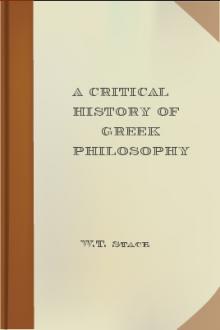Hegel's Philosophy of Mind by Georg Wilhelm Friedrich Hegel (novels to improve english .TXT) 📕

- Author: Georg Wilhelm Friedrich Hegel
- Performer: -
Book online «Hegel's Philosophy of Mind by Georg Wilhelm Friedrich Hegel (novels to improve english .TXT) 📕». Author Georg Wilhelm Friedrich Hegel
§ 463. (3) As the interconnexion of the names lies in the meaning, the conjunction of their meaning with the reality as names is still an (external) synthesis; and intelligence in this its externality has not made a complete and simple return into self. But intelligence is the universal,—the single plain truth of its particular self-divestments; and its consummated appropriation of them abolishes that distinction between meaning and name. This extreme inwardising of representation is the supreme self-divestment of intelligence, in which it renders itself the mere being, the universal space of names as such, i.e. of meaningless words. The ego, which is this abstract being, is, because subjectivity, at the same time the power over the different names,—the link which, having nothing in itself, fixes in itself series of them and keeps them in stable order. So far as they merely are, and intelligence is here itself this being of theirs, its power is a merely abstract subjectivity,—memory; which, on account of the complete [pg 087] externality in which the members of such series stand to one another, and because it is itself this externality (subjective though that be), is called mechanical (§ 195).
A composition is, as we know, not thoroughly conned by rote, until one attaches no meaning to the words. The recitation of what has been thus got by heart is therefore of course accentless. The correct accent, if it is introduced, suggests the meaning: but this introduction of the signification of an idea disturbs the mechanical nexus and therefore easily throws out the reciter. The faculty of conning by rote series of words, with no principle governing their succession, or which are separately meaningless, e.g. a series of proper names, is so supremely marvellous, because it is the very essence of mind to have its wits about it; whereas in this case the mind is estranged in itself, and its action is like machinery. But it is only as uniting subjectivity with objectivity that the mind has its wits about it. Whereas in the case before us, after it has in intuition been at first so external as to pick up its facts ready-made, and in representation inwardises or recollects this datum and makes it its own,—it proceeds as memory to make itself external in itself, so that what is its own assumes the guise of something found. Thus one of the two dynamic factors of thought, viz. objectivity, is here put in intelligence itself as a quality of it.—It is only a step further to treat memory as mechanical—the act implying no intelligence—in which case it is only justified by its uses, its indispensability perhaps for other purposes and functions of mind. But by so doing we overlook the proper signification it has in the mind.
§ 464. If it is to be the fact and true objectivity, the mere name as an existent requires something else,—to be interpreted by the representing intellect. Now in the shape of mechanical memory, intelligence is at once [pg 088] that external objectivity and the meaning. In this way intelligence is explicitly made an existence of this identity, i.e. it is explicitly active as such an identity which as reason it is implicitly. Memory is in this manner the passage into the function of thought, which no longer has a meaning, i.e. its objectivity is no longer severed from the subjective, and its inwardness does not need to go outside for its existence.
The German language has etymologically assigned memory (Gedächtniß), of which it has become a foregone conclusion to speak contemptuously, the high position of direct kindred with thought (Gedanke).—It is not matter of chance that the young have a better memory than the old, nor is their memory solely exercised for the sake of utility. The young have a good memory because they have not yet reached the stage of reflection; their memory is exercised with or without design so as to level the ground of their inner life to pure being or to pure space in which the fact, the implicit content, may reign and unfold itself with no antithesis to a subjective inwardness. Genuine ability is in youth generally combined with a good memory. But empirical statements of this sort help little towards a knowledge of what memory intrinsically is. To comprehend the position and meaning of memory and to understand its organic interconnexion with thought is one of the hardest points, and hitherto one quite unregarded in the theory of mind. Memory quâ memory is itself the merely external mode, or merely existential aspect of thought, and thus needs a complementary element. The passage from it to thought is to our view and implicitly the identity of reason with this existential mode: an identity from which it follows that reason only exists in a subject, and as the function of that subject. Thus active reason is Thinking.
[pg 089]§ 465. Intelligence is recognitive: it cognises an intuition, but only because that intuition is already its own (§ 454); and in the name it re-discovers the fact (§ 462): but now it finds its universal in the double signification of the universal as such, and of the universal as immediate or as being,—finds i.e. the genuine universal which is its own unity overlapping and including its other, viz. being. Thus intelligence is explicitly, and on its own part cognitive: virtually it is the universal,—its product (the thought) is the thing: it is a plain identity of subjective and objective. It knows that what is thought, is, and that what is, only is in so far as it is a thought (§ 521); the thinking of intelligence is to have thoughts: these are as its content and object.
§ 466. But cognition by thought is still in the first instance formal: the universality and its being is the plain subjectivity of intelligence. The thoughts therefore are not yet fully and freely determinate, and the representations which have been inwardised to thoughts are so far still the given content.
§ 467. As dealing with this given content, thought is (α) understanding with its formal identity, working up the representations, that have been memorised, into species, genera, laws, forces, &c., in short into categories,—thus indicating that the raw material does not get the truth of its being save in these thought-forms. As intrinsically infinite negativity, thought is (β) essentially an act of partition,—judgment, which however does not break up the concept again into the old antithesis of universality and being, but distinguishes on the lines supplied by the interconnexions peculiar to the concept. Thirdly (γ), thought supersedes the formal distinction and [pg 090] institutes at the same time an identity of the differences,—thus being nominal reason or inferential understanding. Intelligence, as the act of thought, cognises. And (α) understanding out of its generalities (the categories) explains the individual, and is then said to comprehend or understand itself: (β) in the judgment it explains the individual to be an universal (species, genus). In these forms the content appears as given: (γ) but in inference (syllogism) it characterises a content from itself, by superseding that form-difference. With the perception of the necessity, the last immediacy still attaching to formal thought has vanished.
In Logic there was thought, but in its implicitness, and as reason develops itself in this distinction-lacking medium. So in consciousness thought occurs as a stage (§ 437 note). Here reason is as the truth of the antithetical distinction, as it had taken shape within the mind's own limits. Thought thus recurs again and again in these different parts of philosophy, because these parts are different only through the medium they are in and the antithesis they imply; while thought is this one and the same centre, to which as to their truth the antithesis return.
§ 468. Intelligence which as theoretical appropriates an immediate mode of being, is, now that it has completed taking possession, in its own property: the last negation of immediacy has implicitly required that the intelligence shall itself determine its content. Thus thought, as free notion, is now also free in point of content. But when intelligence is aware that it is determinative of the content, which is its mode no less than it is a mode of being, it is Will.
[pg 091]§ 469. As will, the mind is aware that it is the author of its own conclusions, the origin of its self-fulfilment. Thus fulfilled, this independency or individuality form the side of existence or of reality for the Idea of mind. As will, the mind steps into actuality; whereas as cognition it is on the soil of notional generality. Supplying its own content, the will is self-possessed, and in the widest sense free: this is its characteristic trait. Its finitude lies in the formalism that the spontaneity of its self-fulfilment means no more than a general and abstract ownness, not yet identified with matured reason. It is the function of the essential will to bring liberty to exist in the formal will, and it is therefore the aim of that formal will to fill itself with its essential nature, i.e. to make liberty its pervading character, content, and aim, as well as its sphere of existence. The essential freedom of will is, and must always be, a thought: hence the way by which will can make itself objective mind is to rise to be a thinking will,—to give itself the content which it can only have as it thinks itself.
True liberty, in the shape of moral life, consists in the will finding its purpose in a universal content, not in subjective or selfish interests. But such a content is only possible in thought and through thought: it is nothing short of absurd to seek to banish thought from the moral, religious, and law-abiding life.
§ 470. Practical mind, considered at first as formal or immediate will, contains a double ought—(1) in the contrast which





Comments (0)